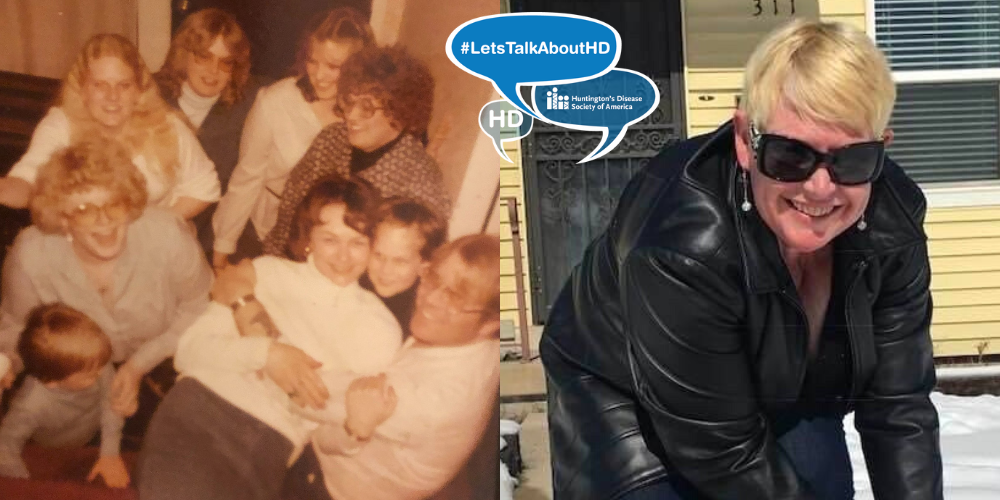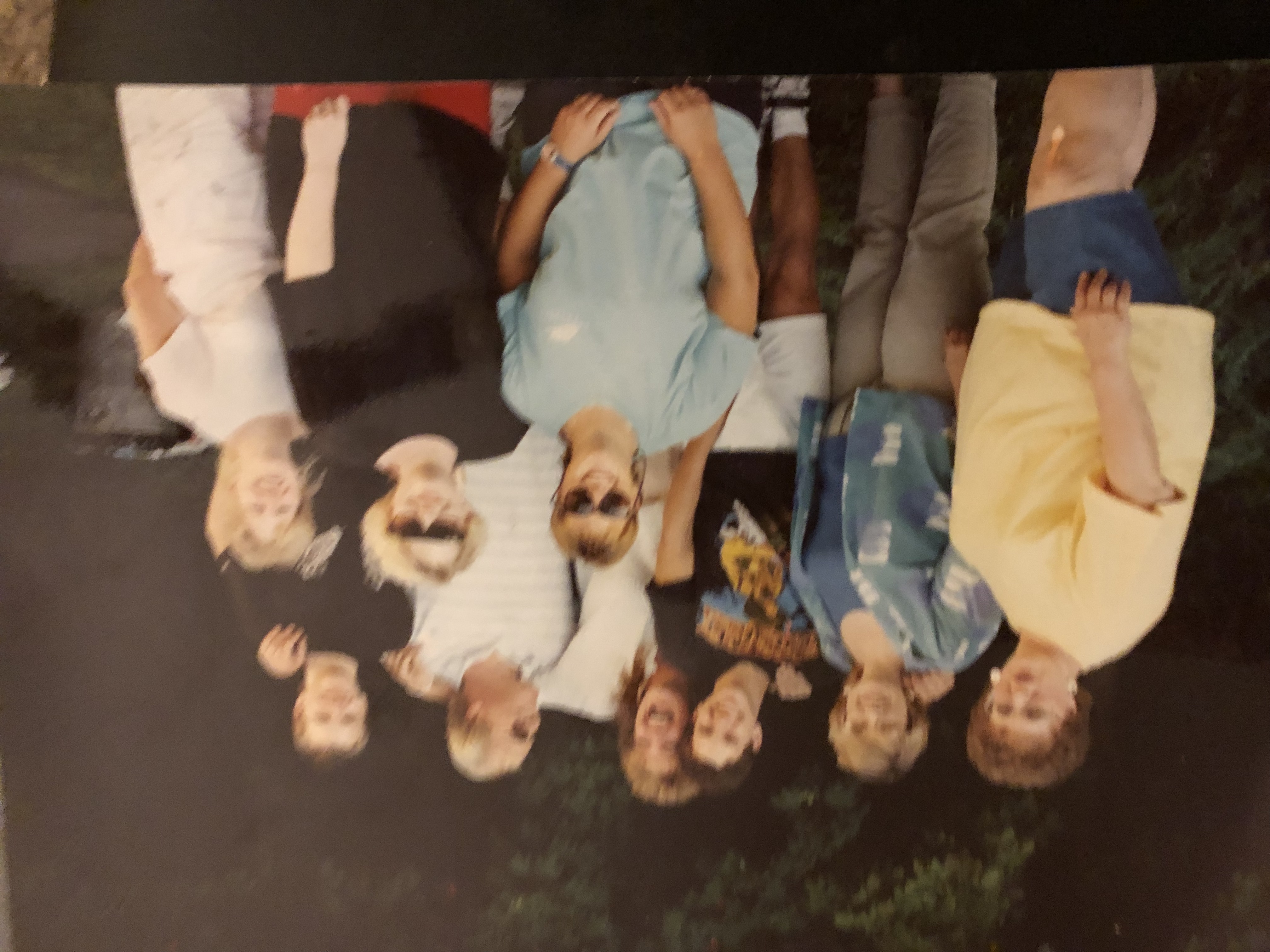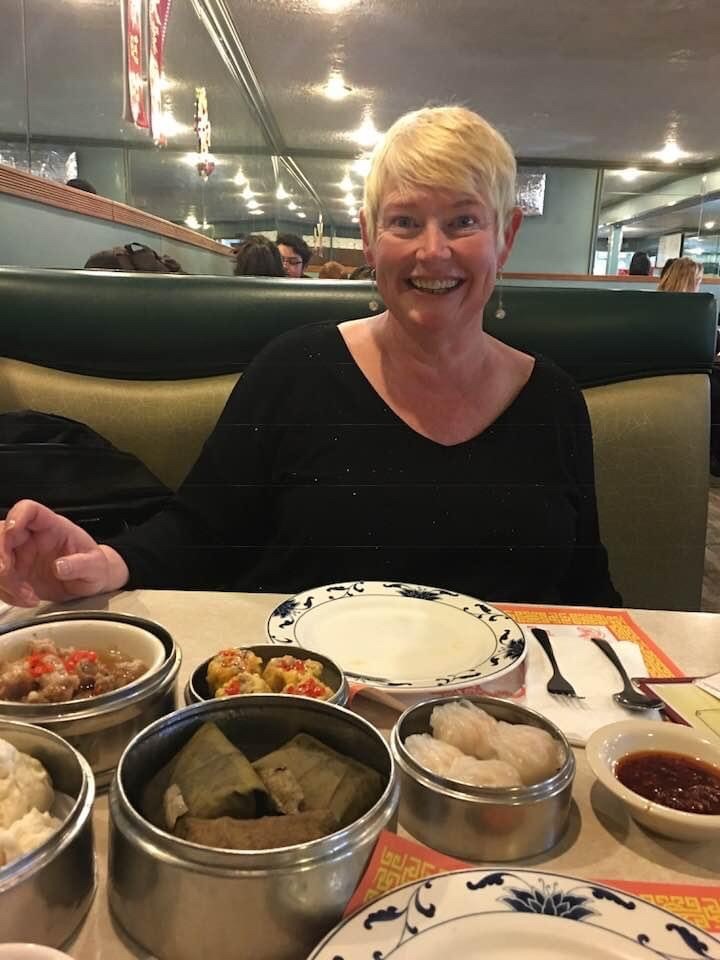
By Matthew Santamaria (msantamaria@hdsa.org)
When she was younger, Utah resident Kristine VanValkenburgh noticed that her grandfather had trouble communicating.
For more than fifteen years, he was bedridden as his symptoms progressed as her grandmother took care of him. He would later pass away.
Her grandfather was diagnosed with Huntington’s disease (HD), a fatal genetic disorder that causes the progressive breakdown of nerve cells in the brain. It deteriorates a person’s physical and mental abilities during their prime working years and has no cure.
“I was raised knowing the word Huntington’s disease that my grandfather had been diagnosed with and had,” said Kristine.
According to Kristine, her great-grandmother was placed in an asylum as she thinks that she may have had HD. The symptoms of HD are described as having ALS, Parkinson’s and Alzheimer’s – simultaneously.

Symptoms include personality changes, mood swings, depression, forgetfulness, impaired judgment, unsteady gait, involuntary movements, slurred speech, difficulty in swallowing, and significant weight loss.
Every child of a parent with HD has a 50/50 chance of inheriting the faulty gene. Kristine’s mother tested positive for HD and also had breast cancer. She would later pass away. Her mother donated her brain because she wanted a cure for HD and wanted to help in any way that she could. To learn more about brain donations, click here
In March of 2022, Kristine’s aunt passed away due to complications from HD. She resided in Maine and her uncle took care of her until he passed away.
Kristine and her sister decided to not get tested unless they were symptomatic and to not have children.
The decision to get genetically tested is difficult to make. Each year, 5-10% are tested. It is never the right or wrong decision to be tested. There are people that see no benefit in knowing that they will develop the disease while others want to know in order to make informed choices about their future. It can take up to several weeks to receive your results from the genetic testing center.
For Kristine, she moved around a lot in her life but her life would soon change as she started to be symptomatic. Almost twenty years ago, she would see a neurologist as she thought that she was experiencing HD symptoms. However, the neurologist dismissed her claims.
Now, she started to experience more symptoms including the inability to learn new things, depression, and anxiety. Kristine got tested for HD and tested positive.
For HD care, Kristine goes to the HDSA Centers of Excellence at the University of Utah. HDSA Centers of Excellence provide an elite team approach to Huntington’s disease care and research. Patients benefit from expert neurologists, psychiatrists, social workers, therapists, counselors, and other professionals who have extensive experience working with families affected by HD and who work collaboratively to help families plan the best HD care program throughout the course of the disease.
Kristine has praised the University of Utah for going above and beyond for her care.
“At the University of Utah, I am treated like a rare bird by skilled loving handlers,” said Kristine.

As Kristine has moved around in her life, she has always been involved with HD awareness. She wants to do more in the Utah area especially bringing more awareness for the HD Parity Act. Without passage of the HD Parity Act, patients with HD will continue to suffer the mandated 2-year waiting period for Medicare benefits after qualifying for Social Security Disability Insurance. To learn more, click here
Kristine has family members with HD that had to wait more than two years to receive benefits. Applying for disability benefits is a necessity for most HD families, but the disability process is often complicated and overwhelming, whether it is a Social Security disability or a private disability. To learn more, click here
“Part of the difficulty with the disability process is having to come to terms with applying for disability,” said Allison Bartlett, HDSA’s Manager of Disability Programs. “There is always fear and concern about the difficulty of the process and how long it will take, but there is also sadness. No one wants to be forced to stop working because of an illness. Every client I have had has said they would keep working if they could. It is okay to be sad and frustrated, that is part of the disability process, but remember that Social Security disability is a benefit that you pay into. If you need SSDI because of an HD diagnosis, you have earned that benefit and no one should feel bad about taking it.”
After her disability claim was approved, Kristine now lives in assisted living. She also made a new friend in the HD Community who has helped her along the way, Becky Blaine (previous HDSA Utah Chapter President and current board member).
“Becky is a force of nature,” Kristine explains. “She has become my in case of emergency person financial helper. Without Becky, I would be homeless."
###
Huntington’s disease (HD) is a fatal genetic disorder that causes the progressive breakdown of nerve cells in the brain. It deteriorates a person’s physical and mental abilities during their prime working years and has no cure. Every child of a parent with HD has a 50/50 chance of inheriting the faulty gene. Today, there are approximately 41,000 symptomatic Americans and more than 200,000 at-risk of inheriting the disease. The symptoms of HD are described as having ALS, Parkinson’s and Alzheimer’s – simultaneously.
The Huntington’s Disease Society of America is the premier nonprofit organization dedicated to improving the lives of everyone affected by HD. From community services and education to advocacy and research, HDSA is the world’s leader in providing help for today and hope for tomorrow for people with HD and their families.
HDSA was founded in 1967 by Marjorie Guthrie, the wife of legendary folk singer Woody Guthrie. Woody died from HD complications when he was only 55 years old, but the Guthrie family legacy lives on at HDSA to this day.
To learn more about Huntington’s disease and the work of the Huntington’s Disease Society of America, visit www.HDSA.org or call 1(800)345-HDSA.
This is a story featuring a personal experience with Huntington’s disease. If you would like to have your story told please contact Matthew Santamaria at msantamaria@hdsa.org
When she was younger, Utah resident Kristine VanValkenburgh noticed that her grandfather had trouble communicating.
For more than fifteen years, he was bedridden as his symptoms progressed as her grandmother took care of him. He would later pass away.
Her grandfather was diagnosed with Huntington’s disease (HD), a fatal genetic disorder that causes the progressive breakdown of nerve cells in the brain. It deteriorates a person’s physical and mental abilities during their prime working years and has no cure.
“I was raised knowing the word Huntington’s disease that my grandfather had been diagnosed with and had,” said Kristine.
According to Kristine, her great-grandmother was placed in an asylum as she thinks that she may have had HD. The symptoms of HD are described as having ALS, Parkinson’s and Alzheimer’s – simultaneously.

Symptoms include personality changes, mood swings, depression, forgetfulness, impaired judgment, unsteady gait, involuntary movements, slurred speech, difficulty in swallowing, and significant weight loss.
Every child of a parent with HD has a 50/50 chance of inheriting the faulty gene. Kristine’s mother tested positive for HD and also had breast cancer. She would later pass away. Her mother donated her brain because she wanted a cure for HD and wanted to help in any way that she could. To learn more about brain donations, click here
In March of 2022, Kristine’s aunt passed away due to complications from HD. She resided in Maine and her uncle took care of her until he passed away.
Kristine and her sister decided to not get tested unless they were symptomatic and to not have children.
The decision to get genetically tested is difficult to make. Each year, 5-10% are tested. It is never the right or wrong decision to be tested. There are people that see no benefit in knowing that they will develop the disease while others want to know in order to make informed choices about their future. It can take up to several weeks to receive your results from the genetic testing center.
For Kristine, she moved around a lot in her life but her life would soon change as she started to be symptomatic. Almost twenty years ago, she would see a neurologist as she thought that she was experiencing HD symptoms. However, the neurologist dismissed her claims.
Now, she started to experience more symptoms including the inability to learn new things, depression, and anxiety. Kristine got tested for HD and tested positive.
For HD care, Kristine goes to the HDSA Centers of Excellence at the University of Utah. HDSA Centers of Excellence provide an elite team approach to Huntington’s disease care and research. Patients benefit from expert neurologists, psychiatrists, social workers, therapists, counselors, and other professionals who have extensive experience working with families affected by HD and who work collaboratively to help families plan the best HD care program throughout the course of the disease.
Kristine has praised the University of Utah for going above and beyond for her care.
“At the University of Utah, I am treated like a rare bird by skilled loving handlers,” said Kristine.

As Kristine has moved around in her life, she has always been involved with HD awareness. She wants to do more in the Utah area especially bringing more awareness for the HD Parity Act. Without passage of the HD Parity Act, patients with HD will continue to suffer the mandated 2-year waiting period for Medicare benefits after qualifying for Social Security Disability Insurance. To learn more, click here
Kristine has family members with HD that had to wait more than two years to receive benefits. Applying for disability benefits is a necessity for most HD families, but the disability process is often complicated and overwhelming, whether it is a Social Security disability or a private disability. To learn more, click here
“Part of the difficulty with the disability process is having to come to terms with applying for disability,” said Allison Bartlett, HDSA’s Manager of Disability Programs. “There is always fear and concern about the difficulty of the process and how long it will take, but there is also sadness. No one wants to be forced to stop working because of an illness. Every client I have had has said they would keep working if they could. It is okay to be sad and frustrated, that is part of the disability process, but remember that Social Security disability is a benefit that you pay into. If you need SSDI because of an HD diagnosis, you have earned that benefit and no one should feel bad about taking it.”
After her disability claim was approved, Kristine now lives in assisted living. She also made a new friend in the HD Community who has helped her along the way, Becky Blaine (previous HDSA Utah Chapter President and current board member).
“Becky is a force of nature,” Kristine explains. “She has become my in case of emergency person financial helper. Without Becky, I would be homeless."
Kristine has a message for the HD Community:
“I feel positive with the advancement of trials for a cure for HD now.
HDSA has been a family to me as I am so thankful for the support.”
“I feel positive with the advancement of trials for a cure for HD now.
HDSA has been a family to me as I am so thankful for the support.”
###
Huntington’s disease (HD) is a fatal genetic disorder that causes the progressive breakdown of nerve cells in the brain. It deteriorates a person’s physical and mental abilities during their prime working years and has no cure. Every child of a parent with HD has a 50/50 chance of inheriting the faulty gene. Today, there are approximately 41,000 symptomatic Americans and more than 200,000 at-risk of inheriting the disease. The symptoms of HD are described as having ALS, Parkinson’s and Alzheimer’s – simultaneously.
The Huntington’s Disease Society of America is the premier nonprofit organization dedicated to improving the lives of everyone affected by HD. From community services and education to advocacy and research, HDSA is the world’s leader in providing help for today and hope for tomorrow for people with HD and their families.
HDSA was founded in 1967 by Marjorie Guthrie, the wife of legendary folk singer Woody Guthrie. Woody died from HD complications when he was only 55 years old, but the Guthrie family legacy lives on at HDSA to this day.
To learn more about Huntington’s disease and the work of the Huntington’s Disease Society of America, visit www.HDSA.org or call 1(800)345-HDSA.
This is a story featuring a personal experience with Huntington’s disease. If you would like to have your story told please contact Matthew Santamaria at msantamaria@hdsa.org
